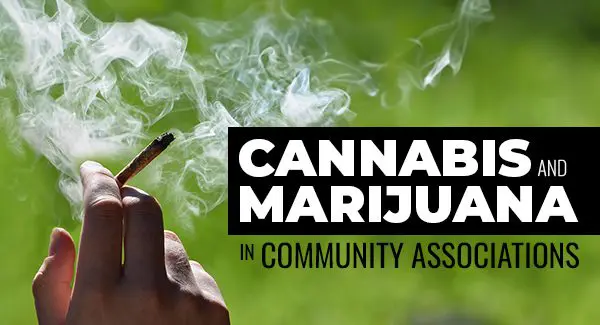- Community Associations, Board Member 101
- Wisconsin, Indiana, Illinois, Florida
Managing a condominium, homeowner (HOA) and townhome community association comes with its fair share of challenges including repairs, owner disputes, parking issues, noise complaints. One issue that has become more common in recent years is cannabis.
With legalization spreading in some states while remaining prohibited in others, board members, property managers, and community leaders are navigating uncharted territory. Some of the questions community associations must address may include:
- Can residents smoke cannabis in their homes?
- How do boards handle complaints regarding the smell drifting into neighboring units?
- How do federal laws impact associations in states where cannabis is legal?
- Can homeowners grow cannabis on their property?
Understanding the Legal Landscape
Perhaps the most important question for any board to consider is how to balance the rights of residents with the association’s rules while complying with the law. While some states permit the recreational or medical use of cannabis, federal law still classifies it as a controlled substance. This discrepancy often leads to confusion and frustration for boards and residents alike.
Associations should review their governing documents – their declaration, rules and regulations, along with any policies related to smoking, nuisance issues, and property use. The association’s attorney can play a critical role in ensuring that the governing documents comply with all applicable laws, which are subject to change.
Developing Enforceable Policies
Beyond legality, the best governing documents reflect the needs of the community. That means cannabis policies should be clear and enforceable. Some associations, for example, have adopted policies that prohibit smoking in common areas such as clubhouses, pool decks, and hallways.
Nuisance complaints are another major concern. Shared spaces and close proximity to neighbors, especially in condominiums and townhomes, often lead to disputes over noise and odors. Residents may share ventilation systems or have units connected by hallways, which can easily transmit strong smells from cooking, plumbing issues, or smoke. That smoke may originate from cigarettes, cigars, hookahs, vaping, or marijuana.
Addressing Cannabis Use Fairly and Legally
Community association policies regarding cannabis use should be carefully drafted by the association’s attorney to ensure they are clear, enforceable, and compliant with state and local laws. It’s also important to consider reasonable accommodations for residents who use medical marijuana under prescription.
Board members and property managers should handle such issues with sensitivity, striking a balance between an individual’s medical needs and the community’s right to a smoke-free environment if that is the association’s policy. There are also legal considerations including federal Fair Housing Act laws which protect individuals with disabilities, including those who may use medical marijuana.
Growing and Cultivating Cannabis in a Community Association
Although less frequent, another issue that arises is residents growing cannabis on their property within the association. This could mean growing marijuana in a condo unit or cultivating plants in the backyard of an HOA home. Even if for personal use, cultivation may violate association rules regarding property use, particularly if it impacts shared utilities or common areas.
Indoor cannabis cultivation also poses fire hazards due to the high-powered lighting and electrical equipment often required. This increases risks for the entire community.
Additionally, some owners may attempt to run unlicensed cannabis-related businesses from their homes, which could violate zoning laws, business licensing requirements, or the association’s governing documents.
Legal Resource
Whether cannabis is legal in your state or not, community associations must proactively address these issues. Work with your association’s attorney to draft clear and enforceable policies. By doing so, you can help avoid disputes or at least be prepared if they arise.
If your association has questions about marijuana regulations, drafting and updating policies, or resolving owner disputes, don’t hesitate to
Do not hesitate to contact our law firm if your community association has questions about marijuana regulations, drafting/updating smoking policies, resolving owner disputes, or other legal concerns.
Please call 855-537-0500 or visit www.ksnlaw.com.
Since 1983, KSN has been a legal resource for condominium, homeowner, and townhome associations. Additionally, we represent clients in real estate transactions, collections, landlord/tenant issues, and property tax appeals. We represent thousands of clients and community associations throughout the US with offices in several states including Florida, Illinois, Indiana, and Wisconsin.
Please note the material contained in this article is for educational and informational purposes only and does not constitute legal advice. No attorney-client relationship is established by your review or receipt of the information contained in this article. You should not act on the information discussed in this article without first obtaining legal advice from an attorney duly licensed to practice law in your State. While KSN has made every effort to include up-to-date information in this article, the law can change quickly. Accordingly, please understand that information discussed in this article may not yet reflect the most recent legal developments. Material is not guaranteed to be correct, complete, or up to date. KSN reserves the right to revise or update the information and statements of law discussed in the article at any time, without notice, and disclaims any liability for your use of information or statements of law discussed on the article, or the accessibility of the article generally. This article may be considered advertising in some jurisdictions under applicable law/s and/or ethical rules/regulations. © 2025 Kovitz Shifrin Nesbit, A Professional Corporation.


